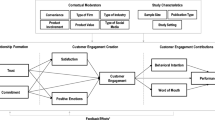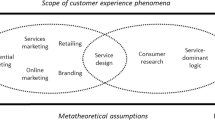Abstract
Purpose
The purpose of this study is to determine which attribution dimensions concerning dysfunctional other-customer misbehavior most influence customer dissatisfaction toward a service firm.
Design/methodology/approach
Our research hypotheses were tested using a 2 (Controllability: controllable versus uncontrollable) × 2 (Stability: unstable versus stable) × 2 (Globality: specific versus global) experimental design in a hypothetical restaurant context.
Findings
Our empirical results demonstrate that when customers feel that the other-customer’s misbehavior can be controlled by the firm (i.e., controllability attributions) or is likely to recur (i.e., stability attributions), they render unfavorable service evaluations toward that firm. However, these harmful effects may be mitigated if the customer believes that the same type of dysfunctional customer behavior also occurs during service encounters in other firms (i.e., globality attributions).
Implications
With a view to diminishing the unsatisfactory experience of other-customer failure, the service organizations need to: (1) act as “police officers” to ensure that their customers behave appropriately; (2) have policies and procedures in place to manage their guests’ behavior so as to reduce the recurrence of other-customer failure; and (3) consider communications intended to enhance attributions of globality following an other-customer failure, that will help to buffer the negative impact of controllability and stability attributions on satisfaction and behavioral reactions with the firm.
Originality/value
This is the first time that controllability, stability, and globality attributions are clearly shown to be part of the process by which customers transfer their negative response to other-customer misbehavior to the organization.




Similar content being viewed by others
References
Abramson, L. Y., Seligman, M., & Teasdale, J. D. (1978). Learned helplessness in humans: Critique and reformulation. Journal of Abnormal Psychology, 87, 49–74.
Anderson, C. A. (1983). The causal structure of situations: The generation of plausible causal attributions as a function of type of event situation. Journal of Experimental Social Psychology, 19, 185–203.
Anderson, J. C. (1987). An approach for confirmatory measurement and structural equation modeling of organizational properties. Management Science, 33, 411–423.
Anderson, J. C., & Gerbing, D. W. (1988). Structural equation modeling in practice: A review and recommended two-step approach. Psychological Bulletin, 103, 411–423.
Bentler, P. M., & Chou, C.-P. (1987). Practical issues in structural equation modeling. Sociological Methods & Research, 16, 78–117.
Bitner, M. J. (1990). Evaluating service encounters: The effects of physical surroundings and employee responses. Journal of Marketing, 54, 69–82.
Bitner, M. J., Booms, B. H., & Mohr, L. A. (1994). Critical service encounters: The employee’s viewpoint. Journal of Marketing, 58, 95–106.
Bitner, M. J., Booms, B. H., & Tetreault, M. S. (1990). The service encounter: Diagnosing favorable and unfavorable incidents. Journal of Marketing, 58, 71–84.
Bougie, R., Pieters, R., & Zeelenberg, M. (2003). Angry customers don’t come back, they get back: The experience and behavioral implications of anger and dissatisfaction in services. Journal of the Academy of Marketing Science, 31, 377–393.
Bradbury, T. N., & Fincham, F. D. (1990). Attributions in marriage: Review and critique. Psychological Bulletin, 107, 3–33.
Choi, S., & Mattila, A. S. (2008). Perceived controllability and service expectations: Influences on customer reactions following service failure. Journal of Business Research, 61, 24–30.
Folkes, V. S. (1984). Consumer reactions to product failure: An attributional approach. Journal of Consumer Research, 10, 398–409.
Folkes, V. S., Koletsky, S., & Graham, J. L. (1987). A field study of causal inferences and consumer reaction: The view from the airport. Journal of Consumer Research, 13, 534–539.
Fullerton, R. A., & Punj, G. (1997). What is consumer misbehavior? Advances in Consumer Research, 24, 336–339.
Grove, S. J., & Fisk, R. P. (1997). The impact of other customers on service experiences: A critical incident examination of “getting along”. Journal of Retailing, 73, 63–85.
Grove, S. J., Fisk, R. P., & Dorsch, M. J. (1998). Assessing the theatrical components of the service encounter: A cluster analysis examination. The Service Industries Journal, 18, 116–134.
Guenzi, P., & Pelloni, O. (2004). The impact of interpersonal relationships on customer satisfaction and loyalty to the service provider. International Journal of Service Industry Management, 15, 365–384.
Harris, L. C., & Reynolds, K. L. (2003). The consequences of dysfunctional customer behavior. Journal of Service Research, 6, 144–161.
Heider, F. (1958). The psychology of interpersonal relationships. New York: Wiley.
Heit, E. (1998). Influences of prior knowledge on selective weighting of category members. Journal of Experimental Psychology: Learning, Memory and Cognition, 24, 712–731.
Hess, R. L., Jr., Ganesan, S., & Klein, N. M. (2003). Service failure and recovery: The impact of relationship factors on customer satisfaction. Journal of the Academy of Marketing Science, 31, 127–145.
Hess, R. L., Jr., Ganesan, S., & Klein, N. M. (2007). Interactional service failures in a pseudorelationship: The role of organizational attributions. Journal of Retailing, 83, 79–95.
Huang, W. H. (2008). The impact of other-customer failure on service satisfaction. International Journal of Service Industry Management, 19, 521–536.
Hunt, K. A., Keaveney, S. M., & Lee, M. (1995). Involvement, attributions, and consumer responses to rebates. Journal of Business and Psychology, 9, 273–297.
Kendzierski, D., & Sheffield, A. (2000). Self-schema and attributions for an exercise lapse. Basic and Applied Social Psychology, 22, 1–8.
Levy, P. E., Cawley, B. D., & Foti, R. J. (1998). Reactions to appraisal discrepancies: Performance ratings and attributions. Journal of Business and Psychology, 12, 437–455.
Lovelock, C. H. (1994). Product plus: How product and service equals competitive advantage. New York: McGraw-Hill.
Lovelock, C. H. (2004). Services marketing (5th ed.). Englewood Cliffs, NJ: Prentice-Hall.
Martin, C. L. (1996). Consumer-to-consumer relationships: Satisfaction with other consumers’ public behavior. The Journal of Consumer Affairs, 30, 146–169.
Martin, C. L., & Pranter, C. A. (1989). Compatibility management: Customer-to-customer relationships in service environments. Journal of Service Marketing, 3, 6–15.
Matta, S., & Folkes, V. S. (2005). Inferences about the brand from counterstereotypical service providers. Journal of Consumer Research, 32, 196–206.
Mattila, A. S., & Patterson, P. G. (2004). The impact of culture on consumers’ perceptions of service recovery efforts. Journal of Retailing, 80, 196–206.
Moore, R., Moore, M. L., & Capella, M. (2005). The impact of customer-to-customer interactions in a high personal contact service setting. Journal of Service Marketing, 19, 482–491.
Oliver, R. L. (1997). Satisfaction: A behavioral perspective on the consumer. New York: The McGraw-Hill Companies, Inc.
Smith, A. K., Bolton, R. N., & Wagner, J. (1999). A model of customer satisfaction with service encounters involving failure and recovery. Journal of Marketing Research, 36, 356–372.
Swanson, S. R., & Kelley, S. W. (2001). Attributions and outcomes of the service recovery process. Journal of Marketing Theory and Practice, 9, 50–65.
Tabachnik, B. G., & Fidell, L. S. (1996). Using multivariate statistics. New York: Harper Collins College Publishers.
Tax, S. S., Colgate, M., & Bowen, D. E. (2006). How to prevent your customers from failing. Sloan Management Review, 47, 30–38.
Weiner, B. (1980). Human motivation. New York: Holt, Rinehart and Winston.
Weiner, B. (1985). An attributional theory of achievement motivation and emotion. Psychological Review, 92, 548–573.
Weiner, B. (2000). Attributional thoughts about consumer behavior. Journal of Consumer Research, 27, 382–387.
Wirtz, J., & Mattila, A. S. (2004). Consumer responses to compensation, speed of recovery and apology after a service failure. International Journal of Service Industry Management, 15, 150–166.
Wu, C. (2007). The impact of customer-to-customer interaction and customer homogeneity on customer satisfaction in tourism service—the service encounter prospective. Tourism Management, 28, 1518–1528.
Acknowledgment
This research was supported by a grant from the National Science Council (NSC97-2410-H-005-029-MY2), Taiwan, awarded to the first author.
Author information
Authors and Affiliations
Corresponding author
Additional information
Received and reviewed by former editor, George Neuman.
Rights and permissions
About this article
Cite this article
Huang, WH., Lin, YC. & Wen, YC. Attributions and Outcomes of Customer Misbehavior. J Bus Psychol 25, 151–161 (2010). https://doi.org/10.1007/s10869-009-9137-x
Published:
Issue Date:
DOI: https://doi.org/10.1007/s10869-009-9137-x




